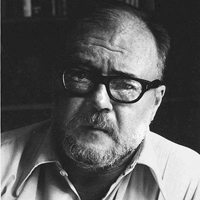James Wright - Biography and Works
James Arlington Wright was a leading American poet whose work explored varieties of social isolation, despair and death. His early works features are regular meter, an emphasis on rhetoric, and the strong use of rhymes. His later work became more natural, abandoning rhyme and moving toward a plain, almost conversational style.

James A. Wright (1927-1980)
Throughout his work, however, Wright concentrated on themes of loneliness and alienation. He often wrote of separation, either the separation brought on by death or the separation of the outsider from society.
Wright was born in Martins Ferry, Ohio, on December 13, 1927. His father worked for fifty years at a glass factory. And his mother left school at fourteen to work in a laundry; neither attended school beyond the eighth grade. While in high school in 1943 Wright suffered a nervous breakdown and missed a year of school. When he graduated in 1946, a year later, he joined the army and was stationed in Japan during the American occupation. The poverty and human suffering Wright witnessed as a child profoundly influenced his writing and he used his poetry as a mode to discuss his political and social concerns.
After he left the army and started college, he studied with the critic John Crowe Ransom and the poet Theodore Roethke. In the first phase of his poetic career, Wright was concerned basically with guilt and suffering. Influenced by the psychologist Carl Jung, the expressionist poet George Trakl, and the South American surrealist Pablo Neruda, he then began writing in an entirely different mode, juxtaposing disparate images and relying on the subconscious mind to intuit connections between them. His poems frequently 'mask' the craft underneath. He modeled his work after Thomas Hardy and Robert Frost, whose engagement with profound human issues and emotions he admired. The subjects of Wright’s earlier books, The Green Wall (winner of the Yale Series of Younger Poets award, 1957) and Saint Judas (1959), include men and women who have lost love or have been marginalized from society for such reasons as poverty and sexual orientation. And they invite the reader to step in and experience the pain of their isolation. Wright possessed the ability to reinvent his writing style at will, moving easily from state to state. His earlier works adheres to conventional systems of meter and stanza. While his later work exhibits more open, looser forms, as with The Branch Will Not Break (1963). James Wright was elected a fellow of The Academy of American Poets in 1971, and the following year his Collected Poems received the Pulitzer Prize in poetry. He died in New York City in 1980.
Cite this Page!
Shrestha, Roma. "James Wright - Biography and Works." BachelorandMaster, 10 Nov. 2013, bachelorandmaster.com/biography/james-wright.html.
